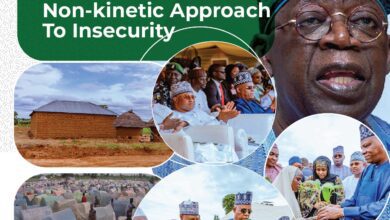OPINION: Digital Universe And Standardization Of Metaverse

Global specialized agency for the information and communications technologies (ICTs) the International Telecommunications Union (ITU) with 193 member nations and 900 corporate organizations has begun the process for standardization of Metaverse.
The new management of ITU led by Secretary General,Doreen Bogdan-Martin. said last week that the new executive has been mandated by governments to expand digital connectivity and promote sustainable digital transformation.
The focus group for this Metaverse standardization “aims to develop a roadmap for setting technical standards to make metaverse services and applications interoperable, enable a high-quality user experience, ensure security, and protect personal data.”
“Standards development must be driven by everyone that will rely on the resulting standards,” said Seizo Onoe, Director of the ITU Telecommunication Standardization Bureau.
“This focus group will support our work together to envision technology use cases for the metaverse, determine the associated technical requirements, and develop standards that help meet these requirements on a global scale.”
Standardization will make metaverse open and free for all unlike the exclusivity it entails.
The metaverse has been defined as “a changing network made up of virtual worlds based on real-time interaction where people can work, socialize with each other, carry out transactions, play and even create things.”
Metaverse “uses virtualization and advanced technologies to fully immerse the user in a virtual world”.
Users could interact directly with a world that is constantly available and that they can access whenever they like.
Bloomberg Intelligence explains that “the metaverse is the next big technology platform, attracting online game makers, social networks and other technology leaders to capture a slice of what we calculate to be a nearly $800 billion market opportunity.”
Social, persistent, shared, virtual 3D worlds, “the metaverse is the convergence of the physical and digital realms in the next evolution of the internet and social networks using real-time 3D software. It presents an opportunity for leading online entertainment and social media companies to capitalize on new revenue streams.”
“The global Metaverse revenue opportunity could approach $800 billion in 2024 up from about $500 billion in 2020, based on our analysis and Newzoo, IDC, PWC, Statista and Two Circles data. The primary market for online game makers and gaming hardware may exceed $400 billion in 2024 while opportunities in live entertainment and social media make up the remainder” according to the Bloomberg Intelligence.
The ability to bring live events such as concerts, film showings and sports into 3D virtual worlds represent additional opportunities for game makers as they elevate online experiences into 3D social worlds to capitalize on the Metaverse opportunity.
“Game makers including Epic Games and Roblox have hosted concerts inside of their games already, while Unity is investing in opportunities to bring live sports content and tools into its 3D development kit”according to Bloomberg Intelligence.
“The metaverse and its layers of technologies can help human development and progress,” said ITU boss Bogdan-Martin. “The work of this ITU focus group is the first step in ensuring that these technologies work well and that they work for all. The benefits of the metaverse should be shared broadly and equitably, and the risks should be well understood and addressed.”
Uniquely in the United Nations family, ITU brings together a global membership of 193 Member States and over 900 member companies, universities, and international and regional organizations to work on issues such as technical standardization.
ITU focus groups, open to all interested experts, accelerate standardization by leading intensive studies in areas of rapidly evolving strategic importance. The metaverse focus group will be active for one year and will conduct “pre-standardization” work as a basis for developing new ITU standards.
To stimulate cohesive metaverse standards development, the focus group aims to elaborate common terms and definitions and promote collaboration among relevant standards bodies.
The focus group will meet for the first time in Riyadh, Saudi Arabia, on March 8 and 9 2023 on the Metaverse standardization.
The forum and meeting will be open for online participation.
Metaverse has the great potential to change the global economy, way of living and communicating and society.
The ITU said the meeting in Riyahd,March 8 and 9 has as objective the need to stimulate global dialogue on metaverse, providing a platform to:
.explore challenges and opportunities for an accessible, sustainable, and inclusive metaverse; foster the development of interoperability standards for an open and inclusive metaverse, and accelerate their development;.debate the role of metaverse in transforming consumer experiences and business models across industries; discuss how metaverse can be used to achieve the Sustainable Development Goals and accelerate digital transformation; .provide inputs and discuss relevant topics that can help accelerate the work of the ITU Focus Group on metaverse.
“The establishment of this focus group is very important to define in a timely manner the standards that contribute to a secure and interoperable metaverse and enable growth and prosperity,” said Abdurahman M. Al Hassan, Chairman of the ITU Telecommunication Standardization Advisory Group from the National Cybersecurity Authority (NCA) of Saudi Arabia.
Roblox, Microsoft’s Minecraft and Epic Games’ Fortnite appear to be early leaders in the race for Metaverse leadership but there’s ample time for other game makers and social networking companies to tweak existing services or launch new ones to capitalize on the market’s growth. Other game makers have been able to attract large, active user bases in online titles such as Activision’s Call of Duty Warzone and World of Warcraft, EA’s the Sims, Take-Two’s GTA Online and Nexon’s MapleStory and Dungeon&Fighter Online. These companies could seek to add additional social features and make user-generated content to become a larger part of their experiences to capture Metaverse demand.
Online game makers and existing social networks may vie for leadership of the burgeoning $800 billion Metaverse economy, on the convergence of megatrends of games, social and user-generated content. Facebook’s user scale and VR investments could give it an edge as the market develops, while game engine vendors Unity and Epic may see heightened software demand.
The ability to bring live events such as concerts, film showings and sports into 3D virtual worlds represent additional opportunities for game makers as they elevate online experiences into 3D social worlds to capitalize on the Metaverse opportunity.






